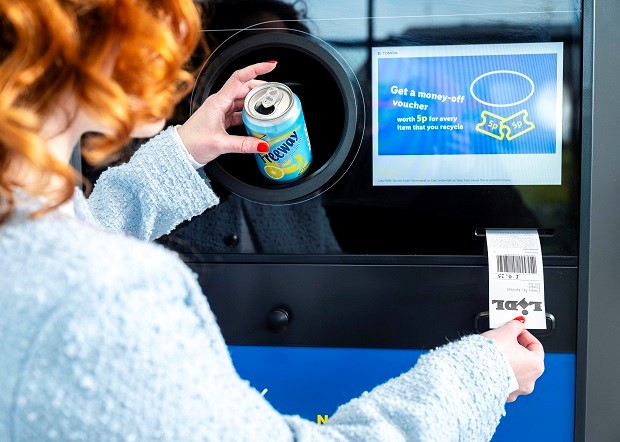

Lidl, the widely known supermarket chain became the first to introduce reverse vending machines (RVM) in its Glasgow stores, allowing customers to receive five pence per container returned without any limit on the number of items. This initiative by Lidl, spanning all 21 stores in the city, will issue vouchers to shoppers for returning empty aluminium and plastic drink containers.

About the scheme
The scheme welcomes aluminium cans and bottles from any retailer, provided they meet specific criteria: cleanliness, absence of crushing and falling within the 100 ml to 3L size range, complete with a readable barcode. Excluded items encompass dairy products in HDPE plastic, Tetra Pak and paper-based cartons, glass containers, and pouches.
Empowering shoppers to actively combat plastic pollution, Lidl unveils an unparalleled initiative where there's no limit to the number of items one can return. With open arms, the discounter welcomes back qualifying bottles and cans from any retailer, emphasizing cleanliness and integrity.
This bold move follows the Scottish Government's postponement of its Deposit Return Scheme (DRS), originally slated for launch on August 16, 2023. Lidl's independent scheme ensures continuity, leveraging existing infrastructure for the benefit of its patrons.
Richard Bourns, Chief Commercial Officer at Lidl GB, stated, "We're on a mission to eliminate all unnecessary waste, and with over 95 per cent of our own-brand packaging now recyclable, reusable, or refillable we've been making great progress. We know that Lidl shoppers share this passion, and we hope that utilising this infrastructure, which might otherwise have been left dormant, will help to make recycling their cans and bottles even more convenient for them. With our extra incentive thrown in and no cap on the number of items that can be recycled, it's a win-win for all."
The launch of this initiative coincides with the postponement of the Deposit Return Scheme (DRS) rollout in Scotland, initially slated for August of last year. Lidl's introduction of this pilot program aims to utilise already-acquired reverse vending machines and is anticipated to intercept 10.5 tonnes of aluminium and plastic.
Lidl's old experiment with recycling
Lidl has previously experimented with container return programs. In 2021, the discount retailer installed reverse vending machines in its stores across Dublin, Glenageary, and Mayo counties. These machines amassed nearly a million plastic bottles and over a million aluminium cans before implementing a deposit return system across Ireland this month. Insights from this endeavour revealed that, on average, an in-store reverse vending machine manages approximately 17,000 weekly items.
Lidl's initiative, which incentivises recycling through monetary rewards, serves a dual purpose: fostering environmental awareness and contributing to community welfare via charitable donations. The potential effects of this incentive on foot traffic and consumer habits are of significant interest to both the recycling and retail industries.



Responses






